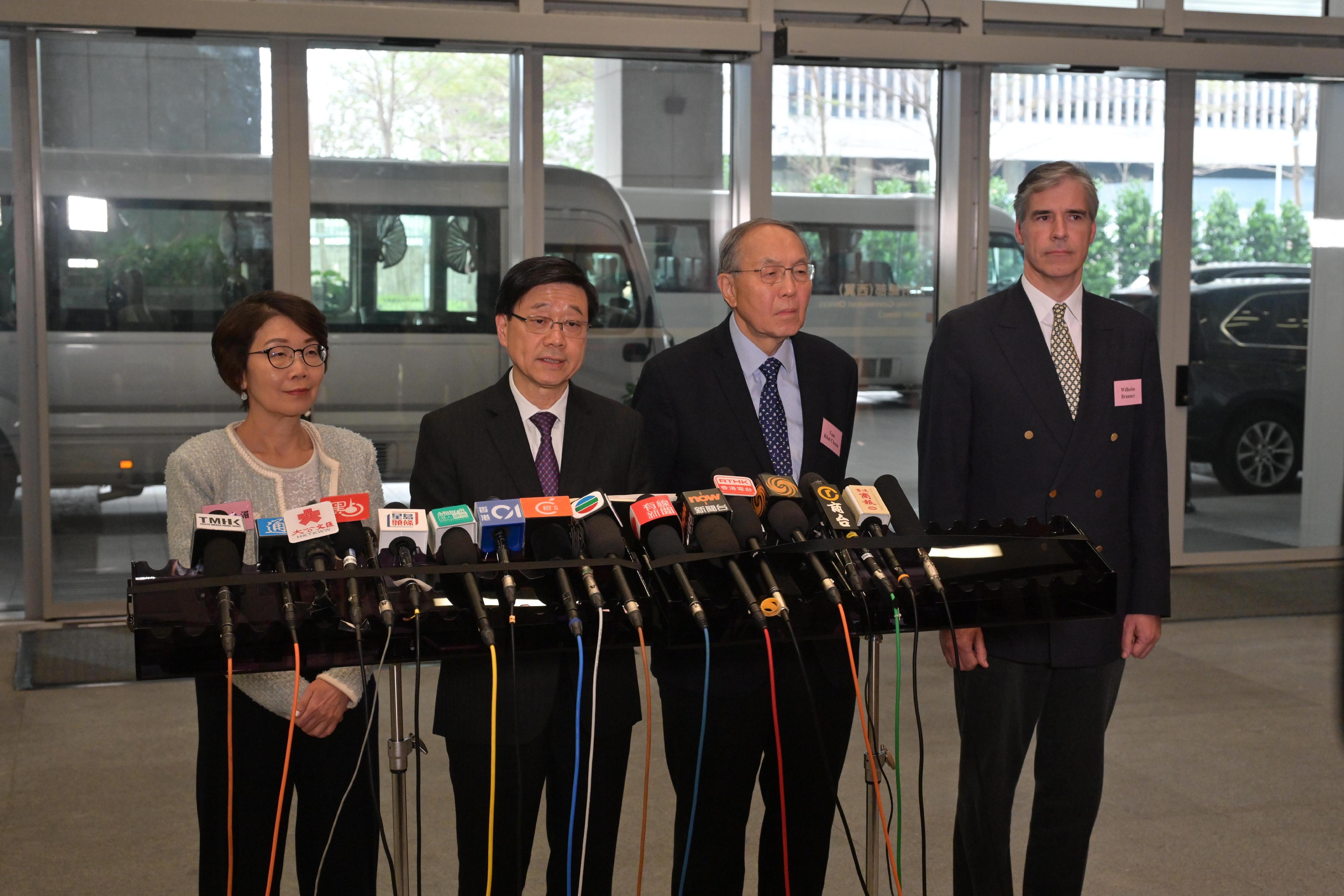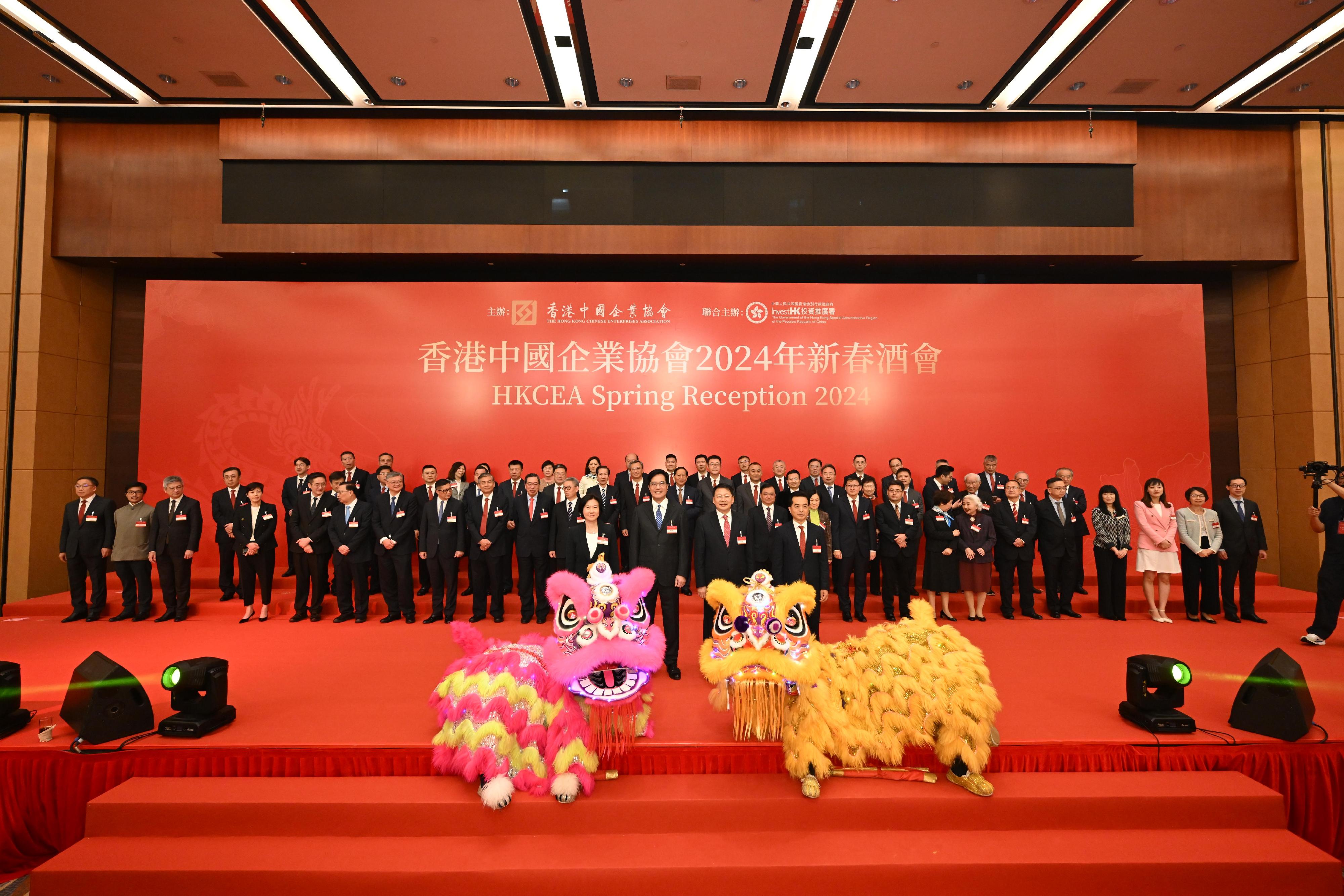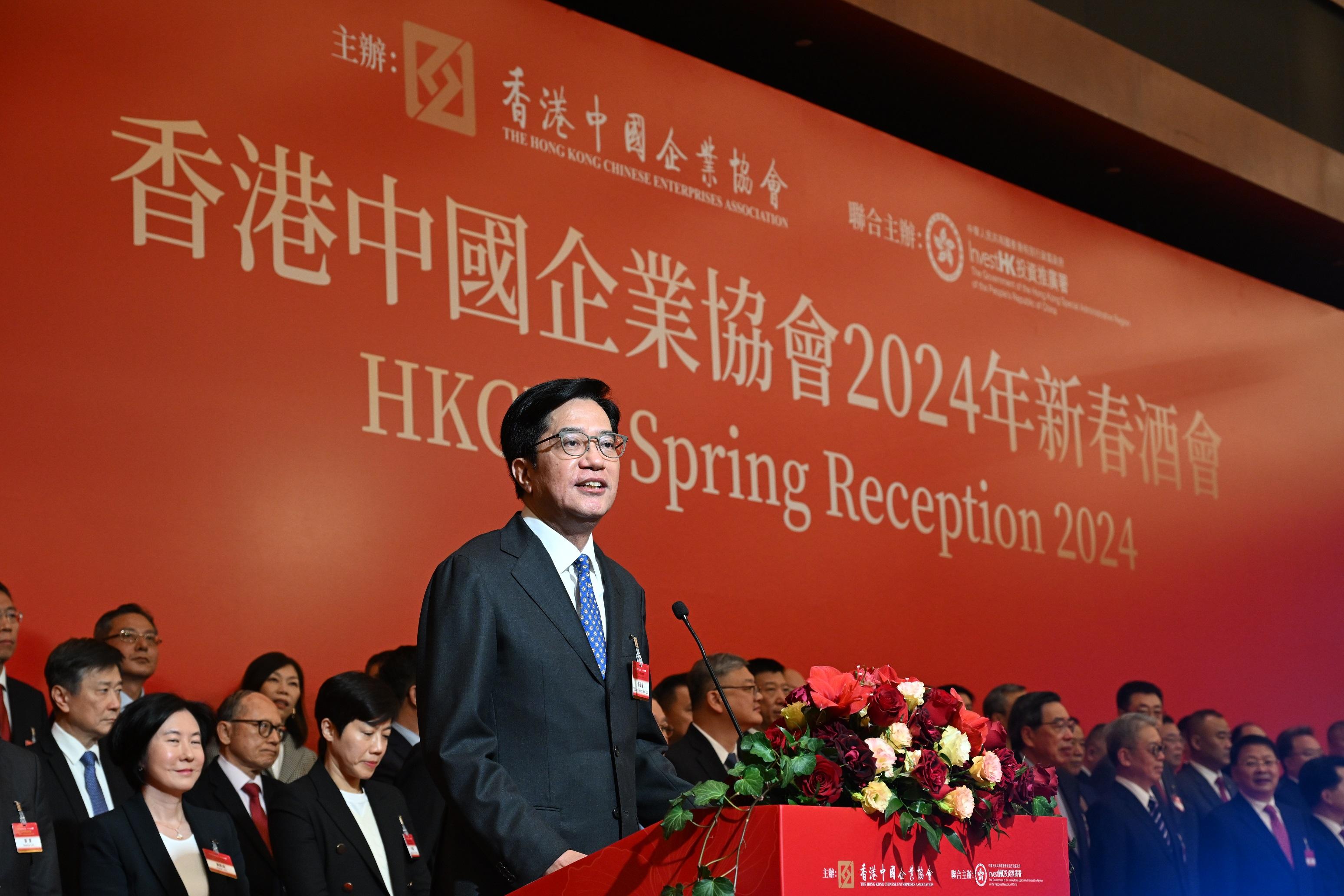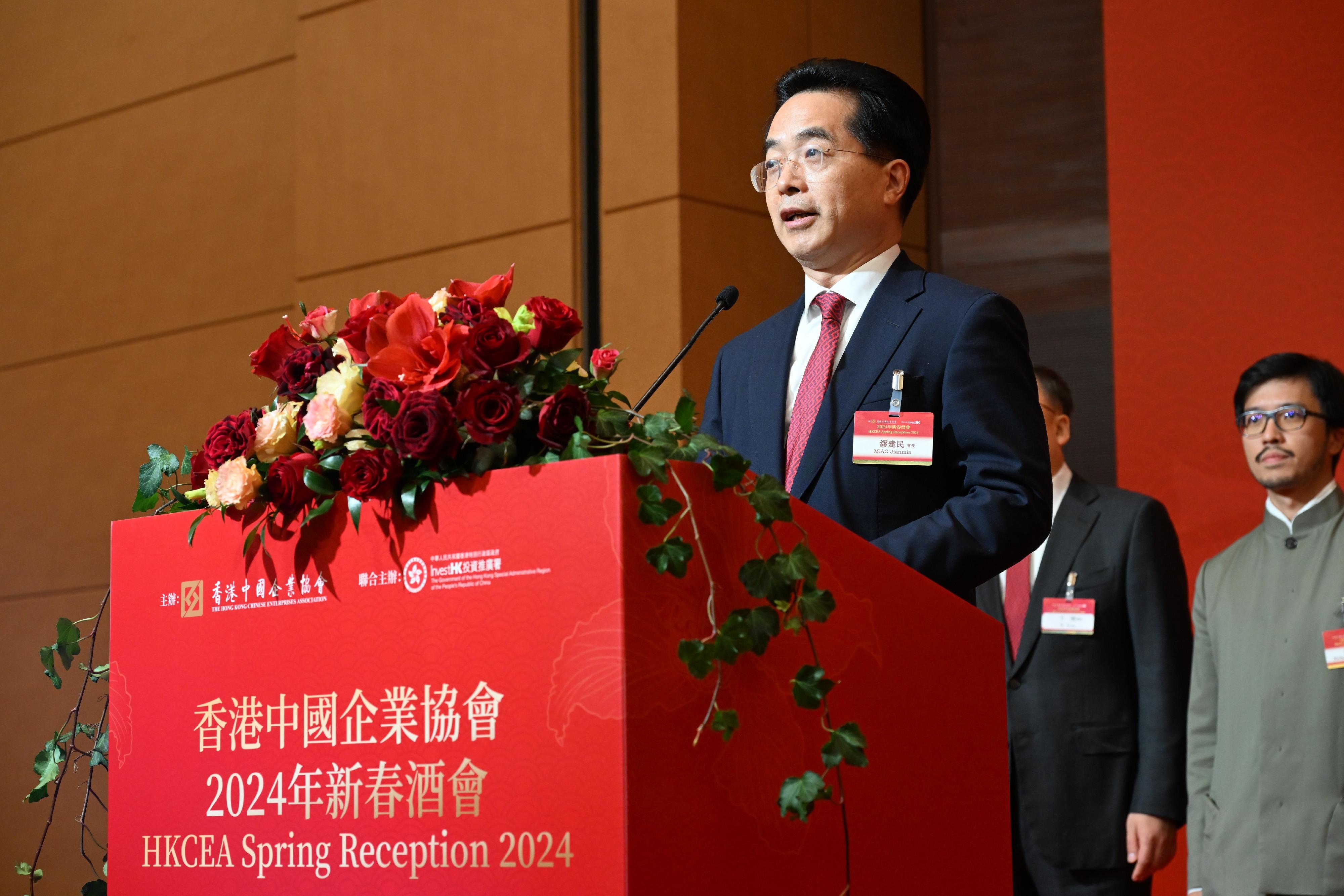Following is the transcript of remarks by the Chief Executive, Mr John Lee, at a media session this afternoon (February 26) after accompanying the Director of the Hong Kong and Macao Work Office of the Communist Party of China Central Committee and the Hong Kong and Macao Affairs Office of the State Council, Mr Xia Baolong, to an engagement session with representatives from local and foreign chambers of commerce:
Chief Executive: Director Xia Baolong is continuing his visit to Hong Kong. Today is his fifth day of the visit here, in what has been a valuable series of sessions for all concerned. Hong Kong’s economic development is, of course, one of the primary objectives of Director Xia’s visit. That underlines the Central Government’s continuing support and care for the economy, and the community, of Hong Kong.
This afternoon, Director Xia held a meeting with about 40 representatives of local and foreign chambers of commerce to listen to their views. The exchange lasted for over 1.5 hours.
Chamber representatives commented on a wide range of subjects and issues, such as economic development of Hong Kong, integration with GBA (Greater Bay Area) and the development of China, access to GBA, convenience to gain access to both the GBA market and the overall Mainland market, regional co-operation with Southeast Asian countries and Middle East countries, tourism, attraction of foreign investments, and how to capitalise the strengths of Hong Kong in areas such as education, I&T (innovation and technology), culture and using Hong Kong as the aviation hub.
The study team attaches great importance to the status of Hong Kong as an international city, and wants to hear the views of local and foreign chambers. The chambers, and their members, have been in Hong Kong for many years, some for decades. They are familiar with Hong Kong’s economic situation and business environment. And they have a good grasp of the global economy and its potential direction in the year. Their experience, their belief in Hong Kong and their open exchange of views were appreciated by the study team.
Hong Kong, let me be clear, will continue to serve as an international financial centre and global city. We will continue to leverage Hong Kong’s “one country, two systems” framework, enjoying the unwavering support of the motherland, while being closely connected to the world at large.
That unique advantage has long blessed Hong Kong, long reinforced our solid institutional foundation. Hong Kong leads global rankings in finance, trade and commerce, as well as in shipping and other professional services. We are the only common law jurisdiction in China, and our courts exercise independent judicial power, including the power of final adjudication. As many of the world’s major commercial and financial centres also practise common law, this commonality enables our legal connectivity with the world, creating more certainty and understanding for all. In turn, it allows Hong Kong to play a bridging role – a “super connector” and “super value-adder” between the Mainland and the rest of the world.
Foreign companies and their investments here are the most solid and visible manifestation of international confidence in Hong Kong. Last year, Hong Kong was ranked number one, globally, in its investment environment. As for enterprise conditions, Hong Kong was tops in the Asia Pacific region and number two globally. According to the 2023 World Investment Report, Hong Kong’s size of foreign direct investment inflows was the world’s fourth-largest. Total deposits in Hong Kong at the end of 2023 exceeded HK$16 trillion. That, let me add, was up 5.1 per cent, year-on-year.
Last year, the number of start-ups in Hong Kong increased by 270, year-on-year, to nearly 4 300. And that, I’m pleased to note, is a record high for Hong Kong. Last year, as well, the number of overseas and Mainland companies establishing or expanding their business in Hong Kong through Invest Hong Kong increased significantly – rising some 27 per cent over the previous year. Among them, we welcomed a 40 per cent increase in the number of companies from the United Kingdom. Those from Singapore rose 35 per cent, while companies from the United States climbed by more than 10 per cent. And the investment these companies are making in their first year of operation, here in Hong Kong, exceeds HK$61.6 billion – nearly three times the previous year’s total.
There’s more, lots more, to say. But I believe these numbers speak, loudly and convincingly, about the confidence local and foreign enterprises have in Hong Kong – in our economy and our future.
Now I would like to invite the chairpersons of local and foreign chambers to speak. I thank for the participation of all the chamber members in the forum earlier and I thank three representatives from the participants to tell you about what they think. They are Mrs Betty Yuen, the Chairperson of the Hong Kong General Chamber of Commerce; the Chairman of the Malaysian Chamber of Commerce (Hong Kong & Macau), Dato’ Gan Khai Choon; and the Chairman of the Austrian Chamber of Commerce (Hong Kong & Macau), Mr Wilhelm Brauner.
Reporter: A few questions for the representatives from the foreign chambers. Did the meeting talk about Article 23? Is there any concern from the foreign businesses regarding Article 23, and how did Director Xia respond? Thank you.
Chief Executive: You have raised the question about the purpose of the meeting we just had with representatives of Hong Kong and foreign chambers. Basically, three points: the study team, led by Director Xia, has made his goal very clear, principally in two areas, one is the economic development of Hong Kong, and also the district administration since we had the new system. And you can see all the arrangements that have been made principally focused on these two areas.
In the earlier forum Director Xia had with the representatives of local and foreign chambers, it is also for the theme of economic development. And I am thankful for the active participation of the chamber representatives, who have given a lot of ideas and views on economic development, which include how to capitalise on the strengths of Hong Kong in the area of education, tourism, I&T, aviation, etc. They have also talked about how they would like easier and more convenient access to the GBA and other Mainland city markets. It is a very good exchange. Director Xia has been very open, and also very keen to listen to the views. And of course, he has also given his opinions in answer to the views expressed.
There were one or two representatives who did talk about Article 23. They basically said that they understood the reason for it, and they supported it, because in their country, they have similar laws, and they don’t have any effect on their consideration and confidence in Hong Kong. In fact, a few even said that, with the stability ensured, then there is a good foundation for development. I would allow other chamber representatives to answer your questions.
(Please also refer to the Chinese portion of the transcript.)






